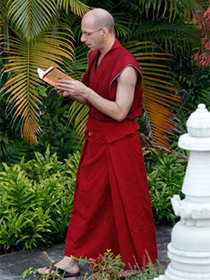- Home
- FPMT Homepage
Foundation for the Preservation of the Mahayana Tradition
The FPMT is an organization devoted to preserving and spreading Mahayana Buddhism worldwide by creating opportunities to listen, reflect, meditate, practice and actualize the unmistaken teachings of the Buddha and based on that experience spreading the Dharma to sentient beings. We provide integrated education through which people’s minds and hearts can be transformed into their highest potential for the benefit of others, inspired by an attitude of universal responsibility and service. We are committed to creating harmonious environments and helping all beings develop their full potential of infinite wisdom and compassion. Our organization is based on the Buddhist tradition of Lama Tsongkhapa of Tibet as taught to us by our founders Lama Thubten Yeshe and Lama Thubten Zopa Rinpoche.
- Willkommen
Die Stiftung zur Erhaltung der Mahayana Tradition (FPMT) ist eine Organisation, die sich weltweit für die Erhaltung und Verbreitung des Mahayana-Buddhismus einsetzt, indem sie Möglichkeiten schafft, den makellosen Lehren des Buddha zuzuhören, über sie zur reflektieren und zu meditieren und auf der Grundlage dieser Erfahrung das Dharma unter den Lebewesen zu verbreiten.
Wir bieten integrierte Schulungswege an, durch denen der Geist und das Herz der Menschen in ihr höchstes Potential verwandelt werden zum Wohl der anderen – inspiriert durch eine Haltung der universellen Verantwortung und dem Wunsch zu dienen. Wir haben uns verpflichtet, harmonische Umgebungen zu schaffen und allen Wesen zu helfen, ihr volles Potenzial unendlicher Weisheit und grenzenlosen Mitgefühls zu verwirklichen.
Unsere Organisation basiert auf der buddhistischen Tradition von Lama Tsongkhapa von Tibet, so wie sie uns von unseren Gründern Lama Thubten Yeshe und Lama Thubten Zopa Rinpoche gelehrt wird.
- Bienvenidos
La Fundación para la preservación de la tradición Mahayana (FPMT) es una organización que se dedica a preservar y difundir el budismo Mahayana en todo el mundo, creando oportunidades para escuchar, reflexionar, meditar, practicar y actualizar las enseñanzas inconfundibles de Buda y en base a esa experiencia difundir el Dharma a los seres.
Proporcionamos una educación integrada a través de la cual las mentes y los corazones de las personas se pueden transformar en su mayor potencial para el beneficio de los demás, inspirados por una actitud de responsabilidad y servicio universales. Estamos comprometidos a crear ambientes armoniosos y ayudar a todos los seres a desarrollar todo su potencial de infinita sabiduría y compasión.
Nuestra organización se basa en la tradición budista de Lama Tsongkhapa del Tíbet como nos lo enseñaron nuestros fundadores Lama Thubten Yeshe y Lama Zopa Rinpoche.
A continuación puede ver una lista de los centros y sus páginas web en su lengua preferida.
- Bienvenue
L’organisation de la FPMT a pour vocation la préservation et la diffusion du bouddhisme du mahayana dans le monde entier. Elle offre l’opportunité d’écouter, de réfléchir, de méditer, de pratiquer et de réaliser les enseignements excellents du Bouddha, pour ensuite transmettre le Dharma à tous les êtres. Nous proposons une formation intégrée grâce à laquelle le cœur et l’esprit de chacun peuvent accomplir leur potentiel le plus élevé pour le bien d’autrui, inspirés par le sens du service et une responsabilité universelle. Nous nous engageons à créer un environnement harmonieux et à aider tous les êtres à épanouir leur potentiel illimité de compassion et de sagesse. Notre organisation s’appuie sur la tradition guéloukpa de Lama Tsongkhapa du Tibet, telle qu’elle a été enseignée par nos fondateurs Lama Thoubtèn Yéshé et Lama Zopa Rinpoché.
Visitez le site de notre Editions Mahayana pour les traductions, conseils et nouvelles du Bureau international en français.
Voici une liste de centres et de leurs sites dans votre langue préférée
- Benvenuto
L’FPMT è un organizzazione il cui scopo è preservare e diffondere il Buddhismo Mahayana nel mondo, creando occasioni di ascolto, riflessione, meditazione e pratica dei perfetti insegnamenti del Buddha, al fine di attualizzare e diffondere il Dharma fra tutti gli esseri senzienti.
Offriamo un’educazione integrata, che può trasformare la mente e i cuori delle persone nel loro massimo potenziale, per il beneficio di tutti gli esseri, ispirati da un’attitudine di responsabilità universale e di servizio.
Il nostro obiettivo è quello di creare contesti armoniosi e aiutare tutti gli esseri a sviluppare in modo completo le proprie potenzialità di infinita saggezza e compassione.
La nostra organizzazione si basa sulla tradizione buddhista di Lama Tsongkhapa del Tibet, così come ci è stata insegnata dai nostri fondatori Lama Thubten Yeshe e Lama Zopa Rinpoche.
Di seguito potete trovare un elenco dei centri e dei loro siti nella lingua da voi prescelta.
- 欢迎 / 歡迎
简体中文
“护持大乘法脉基金会”( 英文简称:FPMT。全名:Foundation for the Preservation of the Mahayana Tradition) 是一个致力于护持和弘扬大乘佛法的国际佛教组织。我们提供听闻,思维,禅修,修行和实证佛陀无误教法的机会,以便让一切众生都能够享受佛法的指引和滋润。
我们全力创造和谐融洽的环境, 为人们提供解行并重的完整佛法教育,以便启发内在的环宇悲心及责任心,并开发内心所蕴藏的巨大潜能 — 无限的智慧与悲心 — 以便利益和服务一切有情。
FPMT的创办人是图腾耶喜喇嘛和喇嘛梭巴仁波切。我们所修习的是由两位上师所教导的,西藏喀巴大师的佛法传承。
繁體中文
護持大乘法脈基金會”( 英文簡稱:FPMT。全名:Found
ation for the Preservation of the Mahayana Tradition ) 是一個致力於護持和弘揚大乘佛法的國際佛教組織。我們提供聽聞, 思維,禪修,修行和實證佛陀無誤教法的機會,以便讓一切眾生都能 夠享受佛法的指引和滋潤。 我們全力創造和諧融洽的環境,
為人們提供解行並重的完整佛法教育,以便啟發內在的環宇悲心及責 任心,並開發內心所蘊藏的巨大潛能 — 無限的智慧與悲心 – – 以便利益和服務一切有情。 FPMT的創辦人是圖騰耶喜喇嘛和喇嘛梭巴仁波切。
我們所修習的是由兩位上師所教導的,西藏喀巴大師的佛法傳承。 察看道场信息:
- FPMT Homepage
- News/Media
-
- Study & Practice
-
-
- About FPMT Education Services
- Latest News
- Programs
- New to Buddhism?
- Buddhist Mind Science: Activating Your Potential
- Heart Advice for Death and Dying
- Discovering Buddhism
- Living in the Path
- Exploring Buddhism
- FPMT Basic Program
- FPMT Masters Program
- FPMT In-Depth Meditation Training
- Maitripa College
- Lotsawa Rinchen Zangpo Translator Program
- Universal Education for Compassion & Wisdom
- Online Learning Center
-
- Prayers & Practice Materials
- Overview of Prayers & Practices
- Full Catalogue of Prayers & Practice Materials
- Explore Popular Topics
- Benefiting Animals
- Chenrezig Resources
- Death & Dying Resources
- Lama Chopa (Guru Puja)
- Lama Zopa Rinpoche: Compendium of Precious Instructions
- Lama Zopa Rinpoche: Life Practice Advice
- Lama Zopa Rinpoche Practice Series
- Lamrim Resources
- Mantras
- Prayer Book Updates
- Purification Practices
- Sutras
- Thought Transformation (Lojong)
- Audio Materials
- Dharma Dates - Tibetan Calendar
- Translation Services
- Publishing Services
- Ways to Offer Support
- Prayers & Practice Materials
-
- Teachings and Advice
- Find Teachings and Advice
- Lama Zopa Rinpoche Advice Page
- Lama Zopa Rinpoche: Compendium of Precious Instructions
- Lama Zopa Rinpoche Video Teachings
- ༧སྐྱབས་རྗེ་བཟོད་པ་རིན་པོ་ཆེ་མཆོག་ནས་སྩལ་བའི་བཀའ་སློབ་བརྙན་འཕྲིན།
- Podcasts
- Lama Yeshe Wisdom Archive
- Buddhism FAQ
- Dharma for Young People
- Resources on Holy Objects
- Teachings and Advice
-
-
*If a menu item has a submenu clicking once will expand the menu clicking twice will open the page.
-
-
- Centers
-
- Teachers
-
- Projects
-
-
-
-
*If a menu item has a submenu clicking once will expand the menu clicking twice will open the page.
-
-
- FPMT
-
-
-
-
-
Be as careful as you can. Our minds are funny. Sometimes we are skeptical of things that are really worthwhile and completely accepting of things that we should avoid. Try to avoid extremes and follow the middle way, checking with wisdom wherever you go.
Lama Zopa Rinpoche
-
-
-
- Shop
-
-
-
The Foundation Store is FPMT’s online shop and features a vast selection of Buddhist study and practice materials written or recommended by our lineage gurus. These items include homestudy programs, prayers and practices in PDF or eBook format, materials for children, and other resources to support practitioners.
Items displayed in the shop are made available for Dharma practice and educational purposes, and never for the purpose of profiting from their sale. Please read FPMT Foundation Store Policy Regarding Dharma Items for more information.
-
-
Advice from Lama Zopa Rinpoche
1
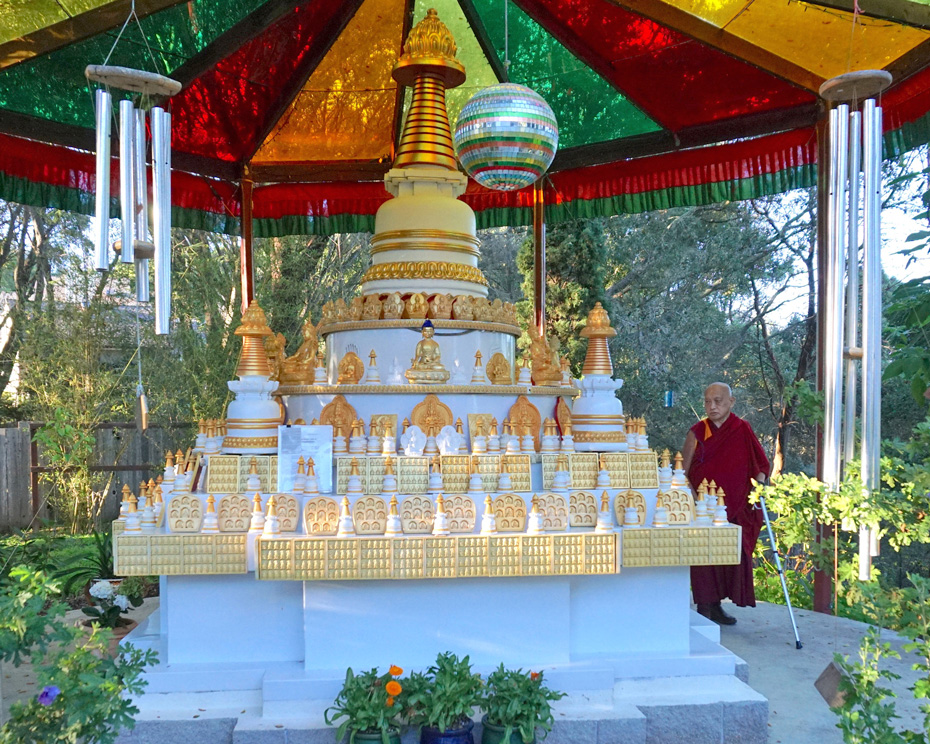
Lama Zopa Rinpoche circumambulating stupas and tsa-tsas at Kachoe Dechen Ling, Aptos, California, US, November 2016. Photo by Ven. Lobsang Sherab.
Lama Zopa Rinpoche gave this advice to a student who said they had a new stupa in their house.
My most dear, most kind, most precious, wish-fulfilling one,
As this stupa was filled at Amitabha Buddha Centre (ABC), then it will have the Four Dharmakaya Relic Mantras inside.
This is a Kadampa stupa, like what Lama Atisha used to carry, keeping the Guru’s hair, robes, and relics inside. When Atisha was on the road, even if a very subtle vice had been committed, he would immediately prostrate to the stupa and confess. This was how he used the stupa, for that purpose.
Here I want to say this: you don’t have to put this stupa on your altar. Many times people don’t even look at the altar. So here, it is so important to see the stupa. Each time you see it there is great, great purification and that brings you to enlightenment; this is just by looking at the stupa.
Therefore, it is better to put it in the kitchen or living room or on a table. If you have many stupas then you can put them on a table and also put other Buddha statues and texts (sutras such as the Vajra Cutter Sutra, Golden Light Sutra, Aryasangata Sutra, and so forth) then you can go around all these holy objects that are on the table. It makes it so easy to circumambulate them.
This is a great thing. It purifies negative karma collected from beginningless rebirths that are obstacles to happiness—temporary and ultimate happiness—and especially to actualizing all the realizations on the path to enlightenment. And it creates the cause to achieve the path to enlightenment—to actualize the teachings that you have heard and read in your heart.
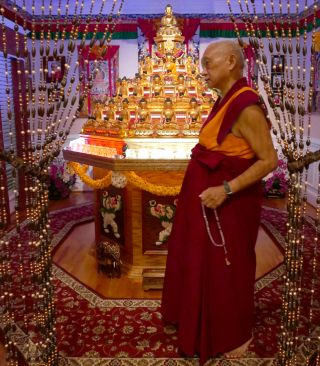
Rinpoche circumambulating stupas and tsa-tsas at students’ home in North Darolina, August 2016. Photo by Ven. Roger Kunsang.
People who are non-believers can also go around the table with this stupa (and if you have them, other holy objects) on it while you are having a conversation with them. In this way even if your speech is non-virtuous, you can still collect unbelievable virtue with your body. And the non-believers also create the cause of enlightenment. There is great purification, and also one is able to collect merits.
It is like the example of Jinpa Palgye (Shrijata). This is a story from the sutras. A long time ago he was a fly who followed the smell of cow dung around a stupa. That action became the cause in his life—when he was eighty years old—to begin to practice Dharma. He achieved renunciation from samsara. And by becoming free from samsara, he achieved the level of Arhat, free from samsara and the causes of samsara—delusion and karma.
Not only non-believers, even when people from outside visit your house, they can also go around. If you have pets, such as dogs and cats, you can also bring them around the stupa that is on the table by holding them in your hands if you can, so they are at the same level as the stupa.
Also if you find worms, insects, or flies in the house, or ants on your body—basically any insect that you find—you can catch them and put them in a plastic bag. Here at ABC they kindly made these insect catchers, which are two small boxes. One is called “method,” and the other is called “wisdom.” So you can put the insect in those, then take them around the stupa a few times, and then release them in a safe place.
Or if you have a thousand ants or crickets in a plastic bag, then you can take them all around the stupa. This plants the seed of enlightenment in all their hearts, and there is great purification of heavy negative karma that has been collected from beginningless rebirths. Also they collect extensive merits.
This is the best present from your side that you can offer them, as they are the cause of all your happiness from beginningless rebirths until now and also in the future. Every single happiness you receive from them. Beside that, they have been kind to you from beginningless rebirths. They have created so much negative karma in order to take care of you. They have suffered unbelievably, unbelievably, unbelievably for you and will do so again in the future, until you are free from samsara.
Therefore, it is so important to be free from samsara as quickly as possible by actualizing wisdom directly perceiving emptiness. So for that you need calm abiding. For that you need pure morality, the three higher trainings, not only if you are ordained but also as a lay practitioner.
Having the Four Dharmakaya Relic Mantras inside the stupa means it also has the Secret Relic Mantra inside. So if you go around the stupa with this mantra inside just one time, it purifies all the heavy negative karmas to be born in the hot hells, down to the eighth hot hell, the unbearable hell realm that has the heaviest suffering. All this gets purified and it makes it so easy to be born in a pure land or to achieve a perfect human rebirth with the eight freedoms and ten endowments, so one has the freedom to practice Dharma and to achieve enlightenment.
When you go around the stupa you can recite OM MANI PADME HUM or other mantras, or if you have some commitments then you can recite them. Because if you sit down to pray then you go to sleep, but when you try to go to sleep, then you are fully awake, but not necessary fully awake in Dharma.
One time in Kachoe Dechen Ling in California, our very precious kind Fabrizio [Pallotti] was in the same area and he was talking to me a long time on the phone. I was in my room and in that room I have a table that has many stupas, prayer wheels, statues, texts, relics, and images of buddhas on it. The table is similar to the altar tables I have in my room in Kopan and also in Dharamsala. The table is round and quite high and has many holy objects on it at a few different levels. You can go around the table. So as I was on the phone I thought to make the time worthwhile while I was talking, so I went around the table with all the holy objects. In this way at least I can collect merit and purify the cause of the lower realms and create the cause to be free from samsara, and also lower nirvana and achieve great enlightenment. By going around the holy objects, at least with the body, one can create virtue and the cause of enlightenment.
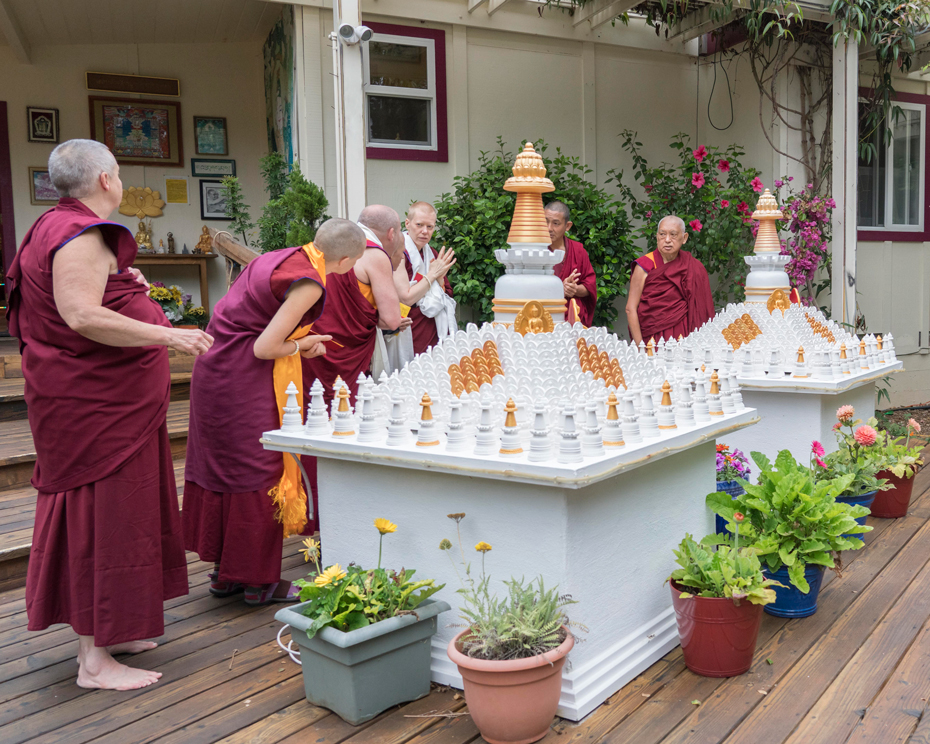
Rinpoche with Sangha next to stupas and tsa-tsas at Kachoe Dechen Ling, Aptos, California, US, August 2018. Photo by Ven. Lobsang Sherab.
Also outside the office at Kachoe Dechen Ling there is a table set up with many Kadampa stupas and tsa-tsas,and a bigger stupa in the center. It is very neatly set up. So while Roger [Kunsang] and Holly [Ansett] are talking on the phone, which happens a lot, then at least they can go around and make the action of the body virtuous and create the cause of enlightenment.
If you put this stupa on the dining room or living room table, it makes it very easy for people to go around every day, many people, so many times a day. It is so good to go around. So then you can rejoice at the end of the day, that at least there was some virtuous action collected. Then as many people spend a long time on the phone, while they are on the phone, they can go around the stupa. So it helps very much to not waste this most precious human rebirth.
You can look at some photos of how I have set up the different stupas at Kachoe Dechen Ling. Also there is one Vietnamese family in North Carolina who has made a thousand Buddha statues, and they made an altar for the statues with many different colored lights. They go around every day, and also even their children go around by themselves as well.
So because we have this perfect human rebirth—it is just one time, it is not sure how long we will have it, life is very short—I am suggesting this so as to not waste your most precious human life, which is more precious that the whole sky filled with wish-granting jewels, not only diamonds. Thank you very much.
With much love and prayers,
Lama Zopa
P.S. Please read and look at the stupas here:
https://fpmt.org/media/newsletters/archives/lama-zopa-rinpoche-news-december-2004/#4
Colophon: Scribed by Ven. Holly Ansett, Kachoe Dechen Ling, Aptos, California, US, October 14, 2015. Lightly edited by Laura Miller, March 2019.
For more on stupas and their benefits, see FPMT Education’s “Stupas: A Resource Guide”:
https://fpmt.org/education/practice/holy-objects/stupas-resources/
Find more advice from Lama Zopa Rinpoche:
https://fpmt.org/teachers/zopa/advice/
Lama Zopa Rinpoche is the spiritual director of the Foundation for the Preservation of Mahayana Tradition (FPMT), a Tibetan Buddhist organization dedicated to the transmission of the Mahayana Buddhist tradition and values worldwide through teaching, meditation and community service.
- Tagged: advice from lama zopa rinpoche, circumambulation, kachoe dechen ling, lama zopa rinpoche, stupas
25
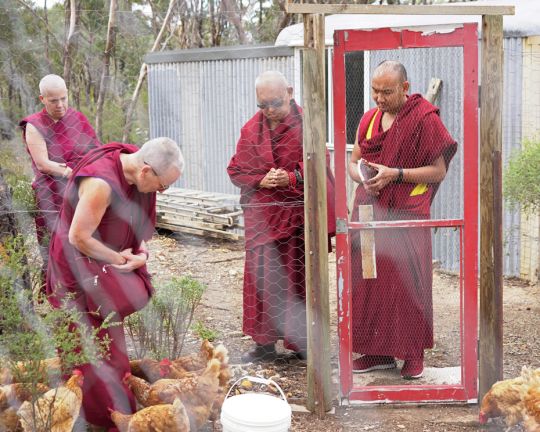
Lama Zopa Rinpoche blessing chickens at Thubten Shedrup Ling Monastery, Bendigo, Australia, April 2018. Photo by Ven. Lobsang Sherab.
During the 2018 retreat in Australia, Lama Zopa Rinpoche was asked, “What is the best way to develop bodhichitta?” You can read Rinpoche’s response in this excerpt from the teaching and in the following video clip.
Many people think there must be some other way to develop bodhichitta. There must be some other way, not lamrim. There must be something special. Not lamrim, not lamrim! Something fantastic! Some other way.
I say “renunciation.” My answer is “renunciation.” The more strongly you see your own suffering in samsara, then when you think of others, you have stronger compassion. You feel others’ suffering in samsara. Then also you have loving kindness for others. You want others to have happiness. And then you have stronger compassion for others to be free from samsara.
For one to do that by oneself—to free all sentient beings from samsara and bring to buddhahood—one has to achieve enlightenment. To do that by oneself alone, then one has to achieve enlightenment. So how strong one’s bodhichitta is depends on the foundation—strong renunciation, strong compassion. When they are strong, then there is strong bodhichitta.
In this southern continent there are all kinds of happiness, but there are all kinds of suffering. There is so much suffering that you can see, you can hear, so much in the world.
The other worlds are not like that. Like the northern continent where everybody lives for one thousand years, nobody is poor, everybody is unbelievably wealthy. Everybody lives for one thousand years. So like that it is very difficult to get renunciation of samsara, so difficult to achieve compassion and bodhichitta.
Here in this world it is much easier. You can see so much suffering. You can feel your own suffering of samsara more strongly. Then it is so easy to develop compassion and so easy to develop bodhichitta.
It is said in Tibetan that due to karma, strong karma, it is easy to generate strong bodhichitta. So we are incredibly fortunate to be born in this time in the southern continent. We are so fortunate because of that. That makes it easy to achieve enlightenment.
Watch Rinpoche teach on “The Best Way to Develop Bodhichitta”:
https://youtu.be/ofZX77L7vnY
Colophon: Excerpted from Lama Zopa Rinpoche’s teachings at the Great Stupa of Universal Compassion, Bendigo, Victoria, Australia, April 10, 2018. Simultaneously transcribed by Ven. Joan Nicell. Lightly edited by Laura Miller, March 2019.
Find complete videos of Lama Zopa Rinpoche’s recent teachings:
https://fpmt.org/media/streaming/teachings-of-lama-zopa-rinpoche/
Lama Zopa Rinpoche is the spiritual director of the Foundation for the Preservation of Mahayana Tradition (FPMT), a Tibetan Buddhist organization dedicated to the transmission of the Mahayana Buddhist tradition and values worldwide through teaching, meditation and community service.
- Tagged: bodhichitta, essential extract, lama zopa rinpoche, lamrim, practical advice, renunciation, video
22
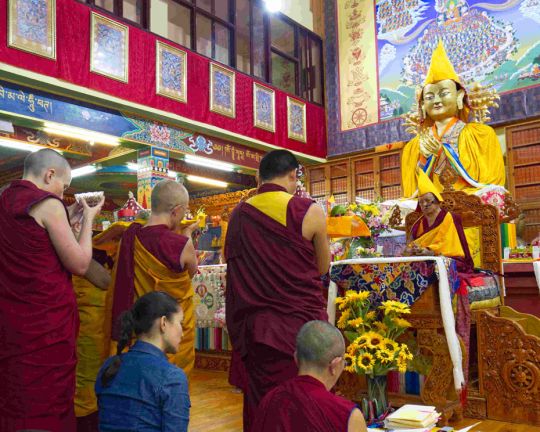
Tsog offering during Lama Chopa, Tushita Meditation Centre, Dharamsala, India, September 2018. Photo by Simon Houlton.
Lama Zopa Rinpoche received a question from a student who was experiencing many obstacles to Dharma practice. In addition to doing the practice of the Thirty-Five Buddhas of Confession and Vajrasattva practice, Rinpoche advised doing mandala offerings:
… Yes, there are some people who have many obstacles when listening to teachings, and when they don’t meditate, then nothing happens. For some people it is like this, and it means there is an obstacle to practice.
It is also very good to do mandala offerings. The mandala offering is very important and at the end of Jorcho preliminary practice, when you make the mandala offering, make a request for the three great purposes.
SPECIAL REQUEST FOR THE THREE GREAT PURPOSES
I prostrate and go for refuge to the guru and the Three Rare Sublime Ones: please bless my mind.
Please bless me and all mother sentient beings to immediately cease all the wrong concepts from disrespect to the spiritual friend up to the subtle dual appearances of the white appearance, red increase, and dark near attainment.
Please bless us to immediately generate all the right realizations from respect for the spiritual friend up to the unification of no more learning.
Please bless us to immediately pacify all outer and inner obstacles. (3x)
The first request is to pacify all the wrong concepts up to subtle dual view of the white, red, and dark visions, next is to generate all the correct realizations from guru devotion up to enlightenment, and the third request is to pacify the outer and inner obstacles.
Outer obstacles are, for example, when you don’t have freedom and you are told by the king, the government or your parents to do something else, like go into the army or kill others, especially to engage in negative karma. Inner obstacles are diseases and also the delusions. Therefore, doing mandala offerings is very important in your life. Then dedicate the mandala. You have to visualize according to the commentary, that is best, and then you collect unbelievable, unbelievable merits, and you dedicate that merit to achieve these three things. That is very, very important, otherwise if you don’t do that, nothing changes.
You should think these obstacles are good and that they arise because of the benefits of practicing Dharma. Think you are experiencing the past karma now; that your past negative karma is finishing. That is a good thing, it is the benefit of practicing Dharma. It is a good thing.
It is very important if you can think that whatever problem you have, you are experiencing that problem for numberless sentient beings. You are experiencing all the suffering and the cause of the suffering—the delusions and karma—for sentient beings, so you receive that from them and then they achieve dharmakaya. This is unbelievable, unbelievable, most unbelievable purification and a quick way to achieve enlightenment. It’s a quick way to enlighten sentient beings, for them to achieve enlightenment. So mostly take the suffering.
Also give your body as a wish-granting jewel, as numberless, so make charity to all those six-realm sentient beings. Then give your possessions and all your past, present, and future merits to numberless sentient beings, so they receive all the happiness. They receive the happiness of this life and of future lives, and ultimate happiness, liberation from samsara, peerless happiness, enlightenment, so they receive everything. Then rejoice. When you give your body, possessions, and merits as a wish-granting jewel, then everything becomes wish-fulfilling for all the sentient beings. The main thing is that they achieve all that happiness, liberation, and enlightenment.
It is very good to do this as much as possible—taking other sentient beings’ sufferings and giving your happiness, your merits etc., to others. It is so good. Spend more time taking others’ sufferings, experiencing the suffering of others, the numberless sentient beings.
This can change your karma. It is a most unbelievable, most unbelievable way to collect merit and a quick way to achieve enlightenment for sentient beings. This is most powerful purification, and it can change your karma the more you do it.
Read Rinpoche’s complete advice “Purifying Obstacles to Dharma Practice,” posted on the Lama Yeshe Wisdom Archive website in January 2019:
https://lamayeshe.com/advice/purifying-obstacles-dharma-practice-0
The FPMT Foundation Store makes available the Lama Chopa Jorcho practice book and commentary by Lama Zopa Rinpoche on this heart practice:
https://shop.fpmt.org/search.asp?keyword=jorcho&search=
Lama Zopa Rinpoche is the spiritual director of the Foundation for the Preservation of Mahayana Tradition (FPMT), a Tibetan Buddhist organization dedicated to the transmission of the Mahayana Buddhist tradition and values worldwide through teaching, meditation and community service.
- Tagged: jorcho, lama chopa, lama zopa rinpoche, purification practice
18
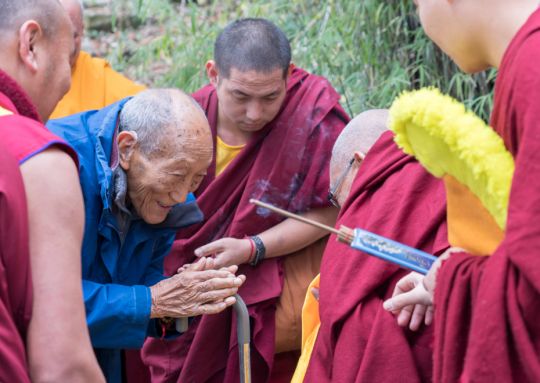
Lama Zopa Rinpoche greeting Khyongla Rato Rinpoche, who is 97 years old, before the long life puja offered to him at Tushita Meditation Centre, Dharamsala, India, February 2019. Photo by Ven. Lobsang Sherab.
During the 2018 retreat in Australia, Lama Zopa Rinpoche gave advice on the main activities to actualize the lamrim. Here is a small excerpt from this teaching:
Lama Tsongkhapa asked Manjushri, “What is the quick way to actualize the lamrim path?”
Manjushri answered, “Three things need to be done. Collecting merits and purification is the first.”
The usual thing is purification by Vajrasattva and so forth, but Vajrasattva is not the only one; there is Samayavajra in particular for the negative karma collected with the guru. But, as I mentioned, the most powerful is what the guru said to do, [to follow] the guru’s wishes, to do that. Pleasing the guru, as I mentioned, is the most powerful way to purify negative karmas and defilements, purifying the obstacles to realizing the path to enlightenment.
Then, with compassion, with a sincere heart, doing hard work for sentient beings, like the bodhisattvas, doing hard work for sentient beings and doing hard work for the Sangha with a sincere mind, with devotion, a sincere mind. Those are the most powerful—as I mentioned yesterday, following the guru’s advice, pleasing the guru’s holy mind, as I mentioned the other night.
Of course, Vajrasattva is known in all the four sects. It is common, but you don’t have to think only of Vajrasattva, “Oh, I need to do three months Vajrasattva,” to have the conditions for that. No, there are so many ways to purify.
As I told the stories the other night, things can change in a minute. In a minute your life, the whole thing, can change—a higher rebirth or lower realms—so then collecting merits. Again the same thing: mandala offering is very common in all four sects, mandala offering with clear meditation. Yes, but of course, again fulfilling the guru’s wishes, pleasing the guru, is, again, collecting the highest merits. Now here it is similar. …
Watch Lama Zopa Rinpoche teach on “Three Main Activities to Actualize Lamrim which Are Found in Lama Chopa”:
https://youtu.be/BsfMxCZxEAE
Colophon: Excerpted from Lama Zopa Rinpoche’s teachings at the Great Stupa of Universal Compassion, Bendigo, Victoria, Australia, April 10, 2018. Simultaneously transcribed by Ven. Joan Nicell. Lightly edited by Laura Miller, March 2019.
Find complete videos of Lama Zopa Rinpoche’s recent teachings:
https://fpmt.org/media/streaming/teachings-of-lama-zopa-rinpoche/
Lama Zopa Rinpoche is the spiritual director of the Foundation for the Preservation of Mahayana Tradition (FPMT), a Tibetan Buddhist organization dedicated to the transmission of the Mahayana Buddhist tradition and values worldwide through teaching, meditation and community service.
- Tagged: essential extract, guru, lama zopa rinpoche, lamrim, merit, practice, purification, video
11
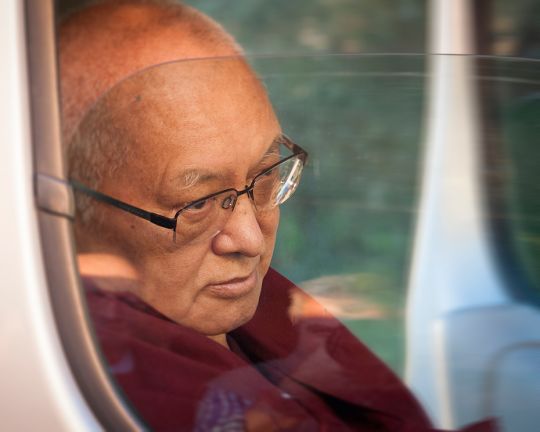
Lama Zopa Rinpoche arriving at the teaching venue during the 100 Million Mani Retreat at Istituto Lama Tzong Khapa, Italy, October 2017. Photo by Piero Sirianni.
During a teaching given at the 2017 100 Million Mani Retreat held at Istituto Lama Tzong Khapa, Italy, Lama Zopa Rinpoche explains how we incorrectly see things.
In the text it says that rabrib, or defective view, is like when you have a vision of hair falling down while you are eating food. There is no hair falling down, but you have a vision of that. It is like when you close your eyes—not totally close them, but close them a little bit when the sun is shining—and [it appears as if] there is all kinds of hair going around. So it is the same for rabrib. It appears to you, but it is not there. So that is the example.
The I, action, object, six sense objects, forms, sounds, smells, tastes, tangible objects, senses, everything, even though it is merely labeled by the mind, it doesn’t appear to me or to you, it doesn’t appear as it is—merely labeled by the mind. Right now, it is merely labeled by the mind. Right before this second, it was merely labeled by the mind. But when it appeared to you, it appears from its own side, existing from its own side, as the real one.
Everything—I, action, object, hell and enlightenment, sense objects, senses—as the Heart Sutra says, all that—elements, the four noble truths, the twelve links—so the real one appearing from there, never came from your mind, nothing to do with your mind. Not merely labeled by the mind, not even came from your mind, just from there. Do you understand what I’m saying? It is a total hallucination. It is decorated, projected there by the ignorance.
It is exactly the same as the hallucinated rabrib. It appeared real, but it is not there. What appeared real to you, what you one hundred percent believe, is not there. This is the same, your daily life—your car, your house, Lama Tzong Khapa Institute—what you see as real is not there.
It is the same as rabrib, as I described—what you see with eyes not completely closed, then you see all these things—but it is not there. It is like when you don’t recognize a dream as a dream. You believe it is real. You see a mirage, you believe the mirage is water, but there is no water. You understand?
While you are walking—real trees, real sky, real road, real pizza—all this, everything is rabrib. You have to meditate like that. You have to practice awareness. …
Watch more from Lama Zopa Rinpoche’s teaching on the defective view in this video clip:
https://youtu.be/9BmWT0nDIQc
Colonphon: Excerpted from Lama Zopa Rinpoche’s teaching at Istituto Lama Tzong Khapa, Italy, October 13, 2017. Simultaneously transcribed by Ven. Joan Nicell. Edited by Nicole Parisi-Smith and Laura Miller, August 2018.
Find complete videos of Lama Zopa Rinpoche’s recent teachings:
https://fpmt.org/media/streaming/teachings-of-lama-zopa-rinpoche/
Lama Zopa Rinpoche is the spiritual director of the Foundation for the Preservation of Mahayana Tradition (FPMT), a Tibetan Buddhist organization dedicated to the transmission of the Mahayana Buddhist tradition and values worldwide through teaching, meditation, and community service.
- Tagged: advice from lama zopa rinpoche, emptiness, essential extract, lama zopa rinpoche, madhyamaka, practical advice, video
8
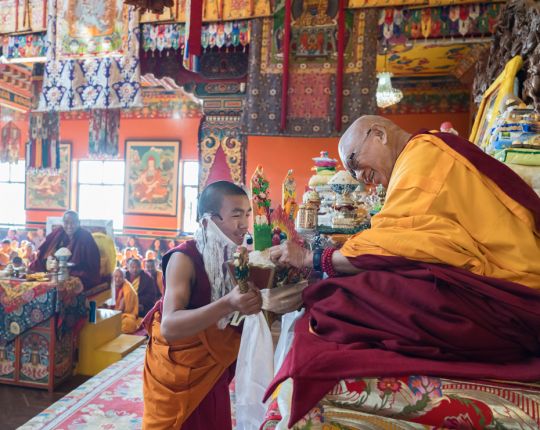
Lama Zopa Rinpoche during a puja on Losar, Kopan Monastery, February 2019. Photo by Ven. Lobsang Sherab.
Advice from Lama Zopa Rinpoche on what to think anytime you are doing a puja:
When doing any puja, you can think, “I am doing this puja for any sentient being who needs this puja.” So motivate for everyone, not for your work or for yourself, and not for money. Then doing the puja becomes Dharma, because of the pure motivation, because of your thought to benefit others.
Then also dedicate for people who are dying or sick, or for anyone who needs it. So all those people who are in so much need for prayers, the puja is for all of them. Whatever you do, try to benefit sentient beings, not just recite prayers.
The whole Buddha Dharma comes to this: to not harm others, and then to benefit others. Just having the mere thought to benefit someone is better than making offerings to numberless Buddhas.
If you follow the mind, which is unsubdued, that harms you and harms numberless sentient beings from life to life. If you practice the good heart, then it only benefits you from life to life.
How do the Kadampa Geshes practice the holy Dharma? They give up their lives for numberless sentient beings, thinking about what is the best for sentient beings. So even when facing sickness or death, think about whatever is of most benefit for sentient beings.
Colophon: Scribed by Ven. Holly Ansett, US, March 2018. Lightly edited by Laura Miller.
See new photos of Lama Zopa Rinpoche in Nepal and India. Find all photo albums of Rinpoche:
https://fpmt.org/teachers/zopa/gallery/
Find complete videos of Lama Zopa Rinpoche’s recent teachings:
https://fpmt.org/media/streaming/teachings-of-lama-zopa-rinpoche/
Lama Zopa Rinpoche is the spiritual director of the Foundation for the Preservation of Mahayana Tradition (FPMT), a Tibetan Buddhist organization dedicated to the transmission of the Mahayana Buddhist tradition and values worldwide through teaching, meditation, and community service.
- Tagged: lama zopa rinpoche, practice, puja
4
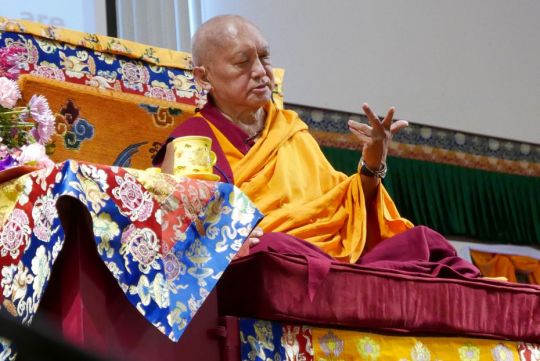
Lama Zopa Rinpoche teaching at the Light of the Path 2016 retreat, Black Mountain, North Carolina, US, August 2016. Photo by Ven. Roger Kunsang.
In August 2016, during the Light of the Path retreat, Lama Zopa Rinpoche advised students to check carefully when meditating on emptiness.
When many people meditate on emptiness they say that nothing exists. Do you understand? Nothing exists. [When you do that] you are not meditating on emptiness. You are meditating that things don’t exist even in mere name, doesn’t exist, nothing, doesn’t exist. Sorry to say this.
I’m sure I do that a lot. I think I do that a lot if I don’t check well. I think when I meditate I do that normal mistake: even in mere name doesn’t exist, complete nihilism, emptiness meditation that is nihilism. You understand?
Remember this: when you meditate on emptiness check to see whether you are meditating on nihilism or not. Make sure. Keep it in mind. Write it down.
This is a suggestion bringing up my own mistakes. Whether it is really meditating on emptiness, whether meditating on nihilism or not, you have to check.
The Prasangika view of emptiness has to be unified with dependent arising. Dependent arising has to be unified with emptiness. That is the Prasangika view of emptiness, the right view, of renunciation, bodhichitta, and emptiness; it is the right view. …
Watch more of Lama Zopa Rinpoche’s advice on meditating on emptiness in this video clip:
https://youtu.be/NGvh-62rWh4
Colonphon: Excerpted from Lama Zopa Rinpoche’s teachings at Light of the Path 2016 retreat, Black Mountain, North Carolina, US, August 16, 2016. Simultaneously transcribed by Ven. Joan Nicell. Edited by Nicole Parisi-Smith and Laura Miller, August 2018.
Find complete videos of Lama Zopa Rinpoche’s recent teachings:
https://fpmt.org/media/streaming/teachings-of-lama-zopa-rinpoche/
Lama Zopa Rinpoche is the spiritual director of the Foundation for the Preservation of Mahayana Tradition (FPMT), a Tibetan Buddhist organization dedicated to the transmission of the Mahayana Buddhist tradition and values worldwide through teaching, meditation, and community service.
25
How to Find a Guru
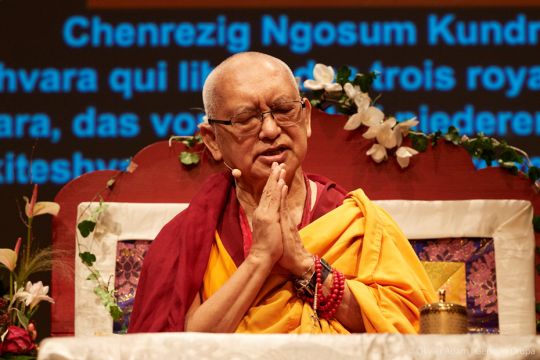
Lama Zopa Rinpoche at teachings organized by Gendun Drupa Center, Martigny, Switzerland, November 2018. Photo by Olivier Adam.
During the 2018 retreat in Australia, Lama Zopa Rinpoche explained how to find a guru, captured in this excerpt and video clip:
As I mentioned, even if you don’t have a guru but study, at least a short teaching, Liberation in the Palm of Your Hand, it’s so clear. That is so important. Then you know what you have to do if you want to follow a guru, if you want to practice. Then you know what to do.
Otherwise it is like looking for a boyfriend or girlfriend. You do the same thing—you make looking for a guru like looking for boyfriend or girlfriend. You do some teachings or initiation, then if you don’t like it, you give up, you throw out—not in the garbage, you can’t do that—but it is like that. Then you do it many times like that in this life.
You’re basically following people you know, they guide you, “Go to this lama, go to that lama.” Then another lama comes along. You don’t know how to practice. You don’t try to study. You don’t know that there is something to study. It’s just a very short time. Then another lama comes, just short time, comes and goes, disappears in the sky, ha-ha. Kind of like that. …
So you must read and study. Generally, people don’t know there is something to study, that there is something to read. They don’t know that. Maybe other people don’t tell, so you don’t know. So it is like that.
If you read, then you know whether you can [have them as your guru] or not. Then you see. All the benefits you come to know and all the shortcomings if you make mistakes. You have to be careful, most careful.
Last night I mentioned that just being famous, or just because the guru has many disciples, that alone that doesn’t mean [that you should have them as your guru]. In the West and in Chinese countries, they are very attracted to that, very attracted. Immediately you follow that. Then one without reputation, without many disciples, you give up. Then one with many disciples, very famous, you follow. It is kind of like that.
Many people are like that, because they don’t understand Dharma. Also I’m not saying everyone like that you can’t trust. I’m not saying that. But that alone is not the reason that you can trust them.
Kyabje Zong Rinpoche used to say, “If they are famous, they should be famous in the monasteries,” not just in the West, but famous in the monasteries—Tibetan monasteries, large monasteries. Nyingma and Kagyu have large monasteries. Gelug has Sera, Ganden, Drepung. That many people there trust them, it should be like that.
That is what Kyabje Zong Rinpoche said. He was one lama from who I received many teachings. He was Lama Yeshe’s guru as well. Kyabe Zong Rinpoche himself, and of course many others like him, were very famous in the monasteries. And now many people have known them for many years. That you can understand.
But even in the monasteries, there are many lamas and geshes with many thousands of disciples, so learned in philosophy, still it doesn’t mean you should make a connection with them as a guru immediately to receive teachings and initiations.
Watch the complete teaching “How to Find the Guru” from Lama Zopa Rinpoche:
https://youtu.be/VL5_XcvnPVI
Colophon: Excerpted from Lama Zopa Rinpoche’s teachings at the Great Stupa of Universal Compassion, Bendigo, Victoria, Australia, April 19, 2018. Simultaneously transcribed by Ven. Joan Nicell. Lightly edited by Laura Miller, February 2019.
Find complete videos of Lama Zopa Rinpoche’s recent teachings:
https://fpmt.org/media/streaming/teachings-of-lama-zopa-rinpoche/
Lama Zopa Rinpoche is the spiritual director of the Foundation for the Preservation of Mahayana Tradition (FPMT), a Tibetan Buddhist organization dedicated to the transmission of the Mahayana Buddhist tradition and values worldwide through teaching, meditation and community service.
- Tagged: essential extract, guru, lama zopa rinpoche, practice, video
22
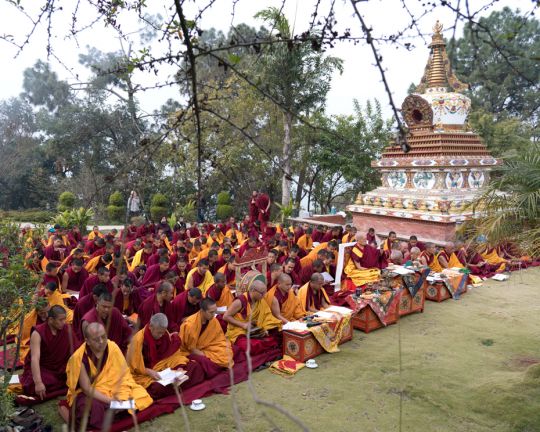
Lama Zopa Rinpoche and monks doing incense puja, Kopan Monastery, February 2019. Photo by Ven. Lobsang Sherab.
Lama Zopa Rinpoche sent this advice about developing a good heart to a student who had been offering healing classes at a center for twenty-five years.
As you know, caring for sentient beings, compassion for sentient beings, cherishing sentient beings, opens the door [to limitless qualities.] As it says in Lama Chöpa [LC92] by the great enlightened being Panchen Losang Chökyi Gyaltsen, and as the Buddha also said,
The mind that cherishes mothers and places them in bliss
Is the gateway leading to infinite qualities.
Seeing this, I seek your blessings to cherish these transmigratory beings
More than my life, even should they rise up as my enemies.
This is the best Dharma practice to help others and the best meditation, the best way to practice, the best healing. To develop the good heart and let them practice this is the best psychology, the best meditation, the best Dharma, the best everything. It is the quick way to achieve enlightenment, the quick way to free sentient beings from obscurations and bring them to full enlightenment quickly.
Below are two stories, examples of this. There are many other stories, many that I don’t know, these are just examples.
Asanga meditated in a cave for twelve years and tried to achieve Maitreya Buddha, but nothing happened. After twelve years he came down and saw a wounded dog covered in maggots on the road. He felt unbearable compassion, so he cut flesh from his thigh in order to pick up the maggots and put them on his flesh. He thought if he picked them up with his fingers he might hurt them, so he thought he must pick up each maggot with his tongue. He closed his eyes and stuck out his tongue to pick up the maggots. Suddenly in front of him was Maitreya Buddha, not the wounded dog.
Before, his mind was obscured and he only saw a wounded dog, but after generating unbelievable compassion he purified so much negative karma he had collected in the past. It was unbelievable purification, by generating compassion, and then he was able to see Maitreya Buddha. He immediately grabbed Maitreya’s robes and asked Maitreya Buddha why he had not come sooner, as he had tried to meditate for twelve years in the cave. He asked why he hadn’t seen Maitreya, and Maitreya Buddha replied, “I was there the whole time, but you could not see me. You know the place where you spat in the cave? That’s where I was.” Then Maitreya showed him the stains of spit on his robes.
The other story is about the great yogi Ngagpo Chöpawa who was going to Odi for the tantric practice of action. On the way, near the river, he saw a lady who was completely black in color, covered with leprosy and with pus coming out of her sores. She could not walk and asked him to take her across the river, but he ignored her.
After some time, his disciple Getsul Tsimbulwa came. He was not a gelong but a getsul, with thirty-six vows. The woman asked him the same thing, to take her across the river. Even though he was a monk and was not meant to touch women, he felt unbelievable compassion the minute he saw her, and immediately carried her across on his back. Because he generated unbelievable compassion for her, even though she was dirty and covered with leprosy, even without crossing the whole river, his negative karma was purified and in the middle of the river he saw her as Dorje Pagmo, an enlightened deity and she took him to the pure land of Dagpa Kachö.
Since our mind is ordinary, obscured, there are many things we see as ordinary, when they are not.
From Lama Zopa Rinpoche’s advice “The Advantages of Cherishing Others,” posted in January 2019 on the Lama Yeshe Wisdom Archive website:
https://lamayeshe.com/advice/advantages-cherishing-others
Lama Zopa Rinpoche is the spiritual director of the Foundation for the Preservation of Mahayana Tradition (FPMT), a Tibetan Buddhist organization dedicated to the transmission of the Mahayana Buddhist tradition and values worldwide through teaching, meditation and community service.
- Tagged: compassion, lama zopa rinpoche
8
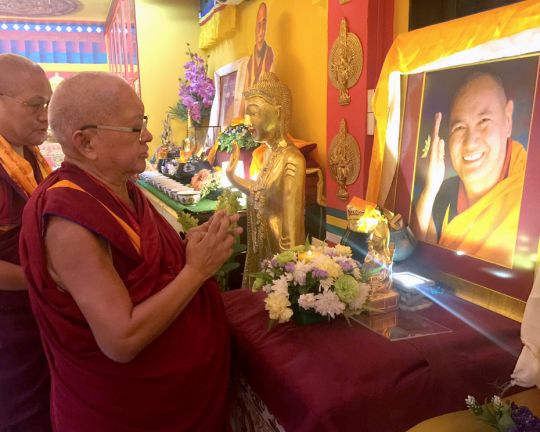
Lama Zopa Rinpoche offering a khata to a photo of Lama Yeshe at Losang Dragpa Centre, Malaysia, 2016. Photo by Ven. Roger Kunsang.
Six weeks after Lama Yeshe’s passing in 1984, Lama Zopa Rinpoche offered a personal tribute to his guru, Lama Yeshe. Here’s an excerpt from “Our Heart Jewel, Our Wish-granting Gem,” first published in Wisdom, #2 1984:
For those of us who have received teachings directly from Lama Yeshe, he was incomparably kinder than all the buddhas of the three times. He took care of us like babies, not only by giving teachings. Lama was more than a mother, more than a father to us, suffering as he did in everyday life for us.
He not only looked after our present life, but our future life also. He led us, helped us make preparation for happiness in this life all the way up to enlightenment.
For all of us it is the greatest sadness that Lama has passed away. We have lost our heart jewel, our wish-granting gem. The remarkable aspect that we can see, that we can communicate with, that we can hear advice from: this has gone.
I think it must be the greatest sadness not only for us, but for many other people also, Tibetan and Western, who are not his disciples; people who have just talked to Lama, or met him briefly when he was traveling, at different times and different places all over the world. Or for those who have only read Lama’s teachings or just heard his holy words. Even those who never saw Lama but only heard his voice on a tape recorder. All these people who have felt Lama’s great warmth, his special character, his great loving kindness, his unbearable compassion; I think Lama’s passing must be a great sadness for them, too.
Lama had such great will, such incredible dedication to work for others. He planned great projects, for the benefit of others and to spread the teachings. Not only did he have the visualization of all this but he was able to actualize it; he accomplished his plans, ensured that they were done, he didn’t just imagine them.
There are many learned lamas and geshe, all bearing the name “holy being” and practicing and teaching Dharma, in the East and in the West. And of them Lama is known to be very special; his actions unbearably compassionate, so excellent. The way Lama gave teachings to Western people especially: so suitable, exactly what was needed, perfect for each individual person.
When the sun rises the darkness of the earth is dispelled. In the same way the darkness of ignorance and problems in the mind of so many sentient beings around the world have been dispelled by the sun of Lama’s teachings. Because of him these past few years, since we first met the Russian princess Zina—so much Dharma has spread to dispel the darkness of ignorance. …
Read more from Rinpoche’s tribute to Lama Yeshe:
https://fpmt.org/mandala/archives/older/mandala-for-1984/wisdom-2-1984/our-heart-jewel-our-wish-granting-gem/
Lama Zopa Rinpoche is the spiritual director of the Foundation for the Preservation of Mahayana Tradition (FPMT), a Tibetan Buddhist organization dedicated to the transmission of the Mahayana Buddhist tradition and values worldwide through teaching, meditation and community service.
- Tagged: lama yeshe, lama zopa rinpoche
4
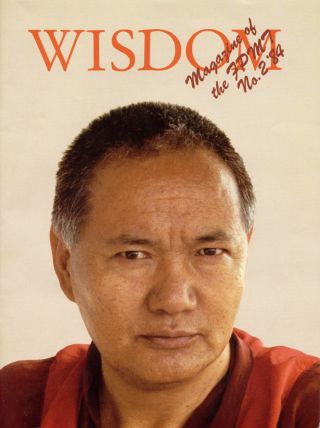
Cover of Wisdom, Number 2 1984. Photo of Lama Yeshe by Ueli Minder, taken in Geneva, Switzerland, 1983.
The Tibetan New Year, Losar, falls on February 5 this year. For FPMT students, this day has additional significance as it commemorates the anniversary of the parinirvana of Lama Yeshe, who co-founded FPMT with Lama Zopa Rinpoche.
Lama Yeshe’s heart stopped beating just before dawn on Losar, March 3, 1984. He was forty-nine years old.
In 1959, Lama Yeshe fled the Chinese Communists in Tibet, going into exile in India. He survived tremendous hardship living as a refugee monk in Buxa Duar, where Lama Zopa Rinpoche became his student.
Then in 1967, the two lamas began teaching Western students, leading to the establishment and flourishing of Kopan Monastery in Nepal and the FPMT organization throughout the world.
As part of Lama Zopa Rinpoche’s advice on how to celebrate Losar and the Fifteen Days of Miracles, Rinpoche recommends that centers host events to introduce new students to Lama Yeshe. These events might include students who knew Lama Yeshe sharing their favorite stories, watching videos of Lama teaching, or reading stories about Lama.
In that spirit, we’re highlighting Wisdom, Number 2 1984. Wisdom was the precursor to Mandala magazine. Its second issue, published not long after Lama Yeshe’s death, commemorated Lama. The issue included some of the last teaching from Lama Yeshe, a report on his passing, and tributes from Tibetan geshes as well as from Western students.
These words from Lama Yeshe’s teacher Geshe Lhundub Sopa Rinpoche, who knew Lama Yeshe at Sera Je Monastery in Tibet, reflect on Lama Yeshe’s goals and achievements:
“… During these past years Lama Yeshe has done so much beneficial activity for so many people, especially in the West. In fact, these two teachers, Lama Yeshe and Lama Zopa, have done such a wonderful job. The result is everywhere in the West—so many centers, so many students who follow the teachings seriously.
“And because of all this activity the students have such a wonderful opportunity to meet other teachers, to receive many, many instructions and teachings. Even in Tibet we didn’t have that kind of opportunity! To have high lamas teaching all the time and giving high initiations, to have all this available is very, very rare.
“So, when I see what has happened in the past few years, it makes me really happy, and I feel such admiration for Lama Yeshe and Lama Zopa and for their students. It is very difficult to follow a new religion coming from a different culture. It is not easy to accept and to follow deeply, but I see so many of you people are doing so, enthusiastically and with faith. I am really amazed when I see all this, and I rejoice and am very happy. …”
You can read the complete tribute from Geshe Lhundub Sopa Rinpoche:
https://fpmt.org/mandala/archives/older/mandala-for-1984/wisdom-2-1984/we-should-be-very-harmonious-and-try-to-help-each-other/
Find all the article from Wisdom, Number 2 1984:
https://fpmt.org/mandala/archives/older/mandala-for-1984/wisdom-2-1984/
Lama Zopa Rinpoche’s advice on practices for Losar and the Fifteen Days of Miracles:
https://fpmt.org/edu-news/ideas-and-advice-for-losar-and-the-fifteen-miracle-days-of-chotrul-duchen-2019/
Lama Zopa Rinpoche is the spiritual director of the Foundation for the Preservation of Mahayana Tradition (FPMT), a Tibetan Buddhist organization dedicated to the transmission of the Mahayana Buddhist tradition and values worldwide through teaching, meditation and community service.
21
How to Benefit a Cat
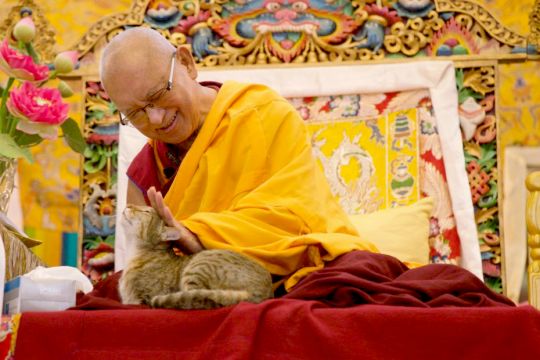
Lama Zopa Rinpoche petting Shamatha the cat who had jumped up onto Rinpoche’s throne, Kopan Monastery, Kathmandu, Nepal, December 2018. Photo by Bill Kane.
Lama Zopa Rinpoche gave the following advice to a student who had asked Rinpoche how to benefit a very sick twenty-one year old cat.
My most dear, most kind, most precious, wish-fulfilling one, I heard you wanted very much to come here but you have a cat that is twenty-one years old and is very sick, so you couldn’t come. I understand, that’s very good taking care of the cat.
It’s good to recite the Maitreya Buddha mantra in the cat’s ear. That causes the cat to never be reborn in the lower realms, to have a higher rebirth, and to meet the Dharma. Also recite Medicine Buddha mantra, Chenrezig Buddha mantra, Milarepa Buddha mantra, and Lotus Pinnacle of Amoghapasha mantra: OM PÄDMO USHNISHA VIMALE HUM PHAT. Recite these mantras several times each day.
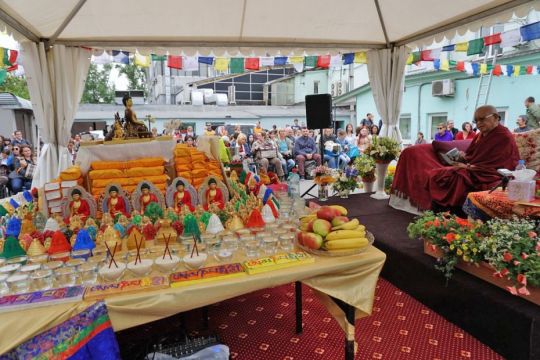
Lama Zopa Rinpoche at an Animal Blessing Day organized by Ganden Tendar Ling with relics, circumambulation of holy objects and altar table, and more, Moscow, Russia, May 2017. Photo by Ven. Lobsang Sherab.
Also recite the Three Principal Aspects of the Path and different lamrim prayers. The most important thing is to take the cat around holy objects. If you can, make an altar on a table and put many holy objects on the table, piled up—tsa-tsas, buddha statues, pictures, and texts, then take the cat around, on the same level as the altar. Put pictures of buddhas, statues, and tsa-tsas, as many as possible, then go around that.
However many holy objects are there—one hundred or one thousand— each time the cat goes around the holy objects, it creates that many causes of enlightenment. It is good to have many tsa-tsas there and to take the cat around them as much as you can before he dies, otherwise there is nothing much you can do.
Here is a powa pill. When the cat dies, put it on his crown with butter and honey.
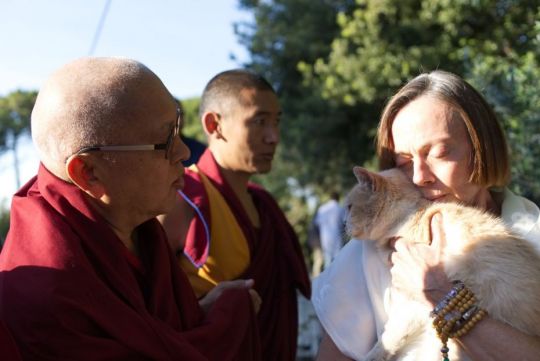
Lama Zopa Rinpoche reciting mantras for a very sick elderly cat, Istituto Lama Tzong Khapa, Pisa, Italy, October 2017. Photo by Ven. Lobsang Sherab.
It is very kind of you to take care of this cat for twenty-one years. Perhaps the cat could also be a recent family member, for example, if your father or mother died, or sometimes it could be your wife from a past life. It could be anything.
Please continue to make your life most meaningful for every sentient being with bodhichitta. Thank you very much. I hope to see you soon.
This advice, “Practices to Benefit a Cat,” is from “Lama Zopa Rinpoche’s Online Advice Book,” published in December 2018 on the Lama Yeshe Wisdom Archive website:
https://lamayeshe.com/advice/practices-benefit-cat
Lama Zopa Rinpoche is the spiritual director of the Foundation for the Preservation of Mahayana Tradition (FPMT), a Tibetan Buddhist organization dedicated to the transmission of the Mahayana Buddhist tradition and values worldwide through teaching, meditation, and community service.
- Tagged: animals, cat, lama yeshe wisdom archive, lama zopa rinpoche
- Home
- News/Media
- Study & Practice
- About FPMT Education Services
- Latest News
- Programs
- New to Buddhism?
- Buddhist Mind Science: Activating Your Potential
- Heart Advice for Death and Dying
- Discovering Buddhism
- Living in the Path
- Exploring Buddhism
- FPMT Basic Program
- FPMT Masters Program
- FPMT In-Depth Meditation Training
- Maitripa College
- Lotsawa Rinchen Zangpo Translator Program
- Universal Education for Compassion & Wisdom
- Online Learning Center
- Prayers & Practice Materials
- Overview of Prayers & Practices
- Full Catalogue of Prayers & Practice Materials
- Explore Popular Topics
- Benefiting Animals
- Chenrezig Resources
- Death & Dying Resources
- Lama Chopa (Guru Puja)
- Lama Zopa Rinpoche: Compendium of Precious Instructions
- Lama Zopa Rinpoche: Life Practice Advice
- Lama Zopa Rinpoche Practice Series
- Lamrim Resources
- Mantras
- Prayer Book Updates
- Purification Practices
- Sutras
- Thought Transformation (Lojong)
- Audio Materials
- Dharma Dates – Tibetan Calendar
- Translation Services
- Publishing Services
- Teachings and Advice
- Find Teachings and Advice
- Lama Zopa Rinpoche Advice Page
- Lama Zopa Rinpoche: Compendium of Precious Instructions
- Lama Zopa Rinpoche Video Teachings
- ༧སྐྱབས་རྗེ་བཟོད་པ་རིན་པོ་ཆེ་མཆོག་ནས་སྩལ་བའི་བཀའ་སློབ་བརྙན་འཕྲིན།
- Podcasts
- Lama Yeshe Wisdom Archive
- Buddhism FAQ
- Dharma for Young People
- Resources on Holy Objects
- Ways to Offer Support
- Centers
- Affiliates Area
- Teachers
- Projects
- Charitable Projects
- Make a Donation
- Applying for Grants
- News about Projects
- Other Projects within FPMT
- Support International Office
- Projects Photo Galleries
- Give Where Most Needed
- FPMT
- Shop
Translate*
*powered by Google TranslateTranslation of pages on fpmt.org is performed by Google Translate, a third party service which FPMT has no control over. The service provides automated computer translations that are only an approximation of the websites' original content. The translations should not be considered exact and only used as a rough guide.Buddhist meditation doesn’t necessarily mean sitting cross-legged with your eyes closed. Simply observing how your mind is responding to the sense world can be a really perfect meditation and bring a perfect result.







